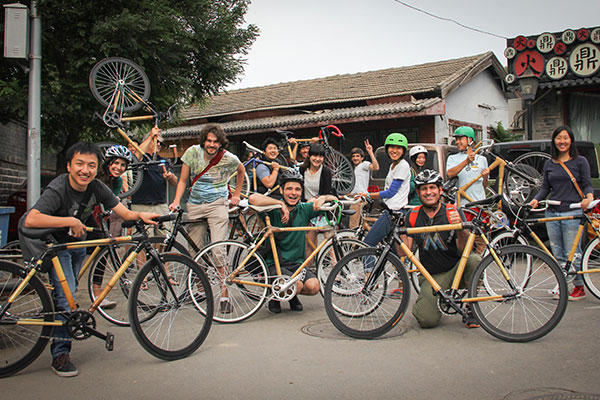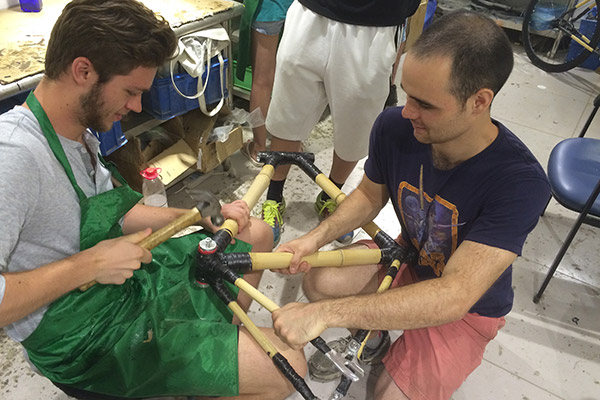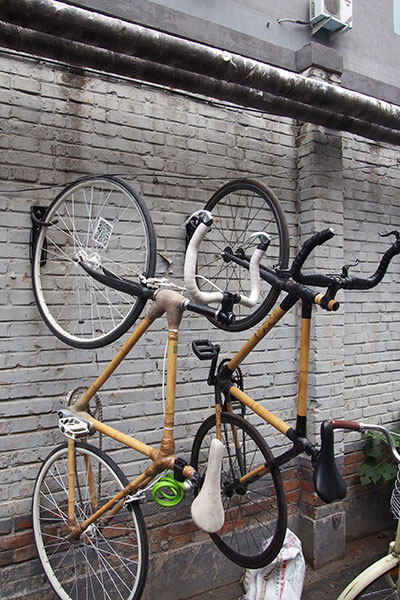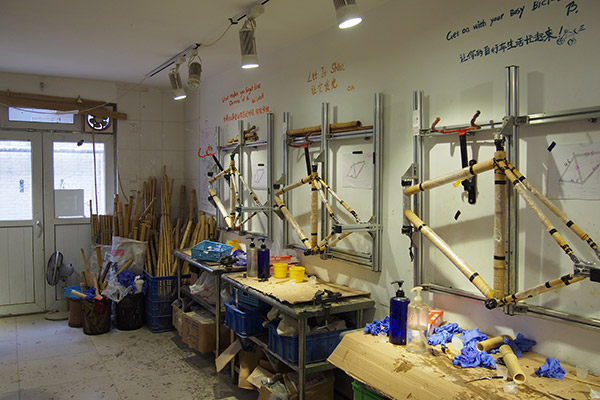
The Bamboo Bicycles Beijing community meets for rides around the city and attracts the interest of passers-by with their bespoke bikes.[Photo provided to China Daily]
Bamboo. For years pandas have eaten it and builders have climbed up it, but in a workshop nestled in a traditional Beijing hutong it’s being transformed into beautiful, bespoke bicycles.
As the Chinese capital stirs to life on a Saturday morning, I pick my way through a pile of bamboos, which I’m supposed to have turned into a bike frame by the end of the weekend.
I have no idea where to begin and realize that my hands are increasingly just used to type on a computer keyboard or smartphone. The last thing I “made” was some flat-pack Ikea furniture or my dinner, and in Beijing even the latter is a rarity.
Luckily I am in the capable hands of Bamboo Bicycles Beijing, thought to be the country’s first do-it-yourself bamboo bike workshop.

David Wang (right), founder of Bamboo Bicycles Beijing, helps workshop participant Mac Goodspeed with his bike.[Photo by Clare Buchanan/ China Daily]
After just two days I am the proud maker and owner of the 155th bamboo bicycle created with the help of BBB. But as I left the workshop what struck me most was the sense of community, engagement and education nurtured by the venture.
Fulbright scholar David Wang says his research into Chinese contemporary culture and youth with China Youthology inspired him to set up BBB in 2014.
He believes that by building bikes you can also build communities that inspire new ideas and actions that are meaningful and important to people.
“Just moving your hands first gets the blood flowing, and people think of new ideas and different things and look for people to help them with them,” he says.

Bamboo bikes hang on the wall opposite BBB.[Photo by Clare Buchanan/ China Daily]
BBB promotes sustainable transport. But Wang says, more importantly, it’s about creating cultural value for the bicycle in a city that was once called the world capital of bikes. Today, Beijing is a motorized, polluted metropolis.
“The more people know our story, then all of a sudden buying a bike might be an alternative way. I think that’s the key. It’s much more from a cultural perspective.
“It’s about creating a culture where we can value bikes. That’s why creating community is important. When you have a community, all of a sudden these social values come up and spread.”
Wang has fostered the “BBB community”, a group of bright, energetic people who help out during workshops and events.

Three bamboo bikes being built in the workshop in Langjia Hutong.[Photo by Clare Buchanan/ China Daily]
Some are people who wanted to help after building their own bikes, others heard about BBB through social media and a few just wanted to create things with others.
“There is nothing here without them. Everything you see in here was the idea of somebody, even the tool rack was somebody’s idea. It’s definitely by no means a one-man operation,” Wang says.
Yan Tianhang took up a BBB internship after hearing about it from her classmate.
During a workshop she patiently lends a hand measuring bamboo and reassures “bike builders” when their sawing skills don’t quite cut it.
“The part I enjoy the most is talking to people from all over the world,” says the 18-year-old, who is going to study at Beijing Institute of Technology.
“In my normal life I don’t have the chance to meet so many people from different countries and I can’t practice my English. At first, I was afraid to talk to people but it has made me more outgoing.”
Yan has been working on bringing an old, rusty bike back to life, a task she describes as “very tough”, but she hopes to collect more unused parts to build a complete bike.
“BBB is like a big family and you can talk to everyone freely, unafraid and you can learn how to build bikes, learn how to paint, learn so many useful things.”
Another intern is getting to know the BBB neighbors; something Wang believes, along with prioritizing knowledge sharing over profit-making and having an open-door policy, leads to productive relationships.
Passersby peer to see what’s happening, one of them, a jewelry maker, stays and starts making necklaces after asking if she could use some tools and bamboo scraps.
Wang says that once after introducing himself to a neighbor, she gave the person a set of folders she had at home that were far better than the ones being used at BBB.
“Getting to know these people helps a lot actually and it’s fun. I think that’s what being neighborly is about.”
A weekend of creativity and customization
I am joined by two other enthusiastic bike builders for Bamboo Bicycles Beijing’s 35th workshop-an American intern, new to the city and looking for a bike to get around, and a German student who plans to take his bicycle home as the ultimate memento of his stay in China.
At first, we select bamboo based on whether we want a consistent look or a mix of light, dark, burnt or weathered pieces.
This is just the start of being able to personally craft and tailor our bicycles to look exactly how we want them to. We have our own set of measurements to work from, so our bike frames are specifically designed according to our heights. Throughout the bike-making process, we are encouraged to be creative.
On the first day, we measure and cut lengths of bamboo before using a tool called a dremel so that the parts fit together as snugly as possible and finally we tack the frames together with the help of epoxy glue.
The second day is all about strengthening our frames by wrapping the joints in fiberglass and carbon fiber soaked in glue.
The joints are then wrapped with electrical tape, which is later removed to reveal a glossy finish. Then it’s just a matter of whacking the bottom bracket with a hammer to remove the plug, a move that emphasizes the strength of our bamboo frames.
Participants in the past have decorated their bikes with rope, hemp or wool, and “tattooed” the bamboo with their own designs, painting the frames their favorite colors.
The custom-made aspect of the workshop holds huge appeal, as during the process you see exactly what goes into your bicycle. You also get to invest a bit of yourself in it and come away with a stronger sense of ownership, as well as a beautiful bike.
If you go
10 am-6.30 pm, Monday to Friday. Workshops run on weekends 9 am to 7 pm and cost 2000 yuan ($320). 26 Langjia Hutong, Dongcheng district, Beijing. www.bamboobicyclesbj.com
